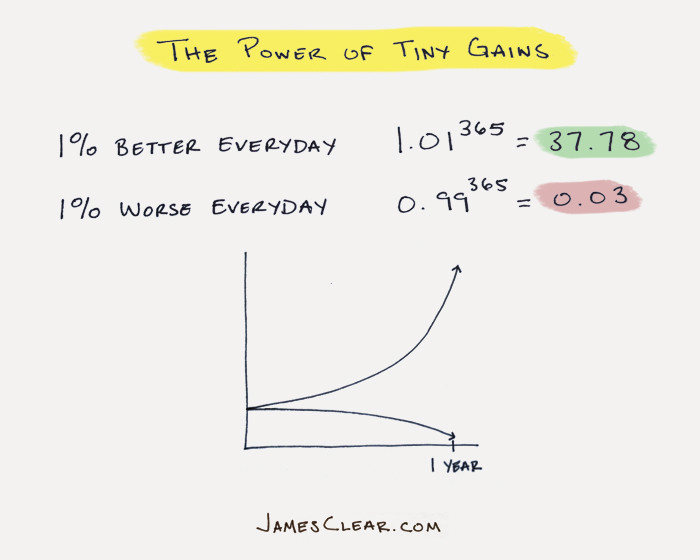Bernard Baruch is one of the most legendary characters in the history of investing. In his biography, Jim Grant writes that Baruch was not as wealthy as most people imagine, but rich enough to live the lifestyle “of a millionaire” (whatever that means). At various times in his life, Baruch…

The Power of Tiny Gains: Small Steps, Big Results
The idea of making significant progress often seems daunting. We tend to focus on grand gestures and ambitious goals, overlooking the power of small, consistent steps. However, the accumulation of tiny gains over time can lead to extraordinary results. The Compound Effect The concept of compounding is not just limited…
12 Books Every Investor Should Read: A Warren Buffett-Inspired Reading List
Warren Buffett, the legendary investor, is a voracious reader. He attributes much of his success to his lifelong pursuit of knowledge. Here are 12 books recommended by Buffett and other investing greats that every investor should consider reading: Classic Investment Texts https://amzn.to/3Z70yYE Modern Investment Insights https://amzn.to/3Z9p7nF Biographies and Memoirs 9.Buffett:…
How Warren Buffett Handles Problems: A Simple Guide
Warren Buffett, a renowned investor, is known for his calm and rational approach to problem-solving. Here are some key strategies he employs: By following these principles, you can approach challenges with a clear mind and a strategic approach, just like Warren Buffett.
How to make consistent money in Option Trading
Keep your fund in FD or buy some debt fund.Yearly return 6%-7%.Use collateral to trade intraday and on expiry day.Here sell only option which are trading at 8-12 Rs on normal day with leverage.You will make weekly 0.2-0.3% return. 2/nTake position bon Wednesday to get another 0.2% return per week….
To all option sellers
To all option sellers, Whenever I am selling an option first I am utilising my 20%-25% capital only if the trade goes against me I will exit my sell position if the option doubles or 2.5X From my sell position initially I am using only 25% capital I will not…
Common question to me every time from new comers in Option Trading
Concentrate only on support, resistance, breakout and volume. Google it. You will get it. Normally supply and demand are moving in slow motion. Useful for players with low capital. 2. Supply and demand theory requires patience to hold your position.It can move slowly. That’s why it is useful for low capital….
How to Make ₹30,00,00,000 (30 crores) in trading capital from ₹22,500.
Took it 2187 days, while operating with more than 30% ROI each year. Here are 10 steps of their wild journey: I hope it’s helpful to someone. 1) Trading Journey Their journey started in 2017 with a capital of ₹22,500 which was amassed by friends who contributed 500-1000 rs each….
Trading Psychology: Mastering Your Mindset for Success 💼💡
1. Its time to dive into the fascinating world of trading psychology In this thread, we’ll explore key insights and strategies to help you develop a rock-solid mindset for successful trading. Let’s dive in! 🚀 (1/10) Embrace uncertainty: Trading is inherently unpredictable. Accept that you can’t control the markets, but you…
The IRON FLY STRATEGY is the most valuable hedging strategy you aren’t using.
Knowing how to use it will protect you from gaps, intraday spikes, and 10x your hedging experience. Here’s the step-by-step guide: Here’s what you’ll learn in this thread: 1. What is an iron fly 2. Perks and Drawbacks 3. What should you do when you are in profit? 4. How…
Why few traders are going bankrupt after attaining huge success.Could be the following psychology.During initial days trader is generating huge ROI with less capital.
As time passes capital is growing and after certain limit of big capital it is very difficult to achieve same ROI because of low liquidity in trading.Due to low ROI trader can feel that his performance is not up to the mark as it was earlier. So, a trader can…
1.Why big traders are not taking more risk in trading?
On Thursday due to blunder my morning m2m was – 5.89 cr.If no blunder it could have around -1.2 cr only. In my early days of trading I was playing very aggressively with directional trading. 2.I have applied same psychology on Thursday with directional trading.Bought far OTM option immediately to…
Position size in trading by Mitesh Patel Trader
Mitesh Patel (@Mitesh_Engr), the well-known options Trader, has given important pointers on the importance of position sizing. Position size in trading. Base capital 50L Future contract lot average value 7L. I will buy or sell only 1 lot naked overnight with 50L capital. In worst condition if 10% gap up/down…
How to adjust short straddles
Based on the views of experts, the following is a summary of the numerous ways in which a short straddle can be adjusted: (i) Shift the tested side which has become ITM. ITM options have a delta of 1. So, if the straddle is at 15800 and the Index moves…
How to adjust straddles in the Bank Nifty by Mitesh Patel Trader
Mitesh Patel @Mitesh_Engr, the well-known options Trader, has explained how straddles in the Bank Nifty can be adjusted so that it can be closed at a profit. How to sell option?Here let me explain through simple math.Say BN at 3000030000 straddle trading at combine premium 800 ( based on current…
The Legend of Rice and Chess: A Tale of Exponential Growth
The legend of rice and chess is a classic parable that illustrates the power of exponential growth. It’s a story that has been told and retold for centuries, captivating audiences with its simple premise and astounding conclusion. The Tale A wise man, having invented the game of chess, presented…
The Power of Compounding: A Warren Buffett Masterclass
Warren Buffett, often hailed as one of the greatest investors of all time, is a strong advocate of the power of compounding. This principle, often referred to as the “eighth wonder of the world,” is the process of reinvesting earnings to generate exponential growth over time. Understanding Compounding Compounding is…
The Danger of Comparing Yourself to Others: A Path to Self-Sabotage
In today’s age of social media, where curated highlights of people’s lives are constantly displayed, it’s easy to fall into the trap of comparing ourselves to others. While a little healthy competition can be motivating, excessive comparison can lead to feelings of inadequacy, jealousy, and self-doubt. The Illusion of Perfection…
Avoiding Stupidity: A Path to Success
In a world that often glorifies brilliance, it’s easy to forget that avoiding stupidity is often a more reliable path to success. While striving for excellence is admirable, it’s equally important to recognize and mitigate the potential for errors and mistakes. The Importance of Avoiding Stupidity Strategies for Avoiding Stupidity…
The Noise Bottleneck: When More Information is Harmful
In our information-saturated age, we’re constantly bombarded with data from every corner of the globe. While access to information has undoubtedly expanded our knowledge and understanding, it has also created a new challenge: the noise bottleneck. This phenomenon, popularized by Nassim Nicholas Taleb, highlights the paradox that more information can…

